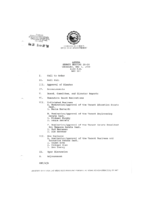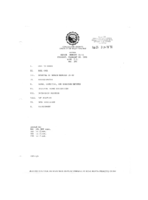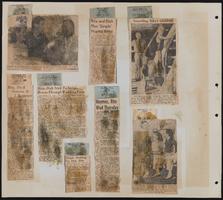Search the Special Collections and Archives Portal
Search Results

Maria Benítez oral history interview: transcript
Date
Archival Collection
Description
Oral history interview with Maria Benítez conducted by Monserrath Hernández and Maribel Estrada Calderón on June 21, 2019 for the Latinx Voices of Southern Nevada Oral History Project. Maria Benítez is the image of a hardworking and determined Salvadoran woman. After facing adversity amidst the Salvadorian Civil War she talks about her journey as a nurse in El Salvador and migrating to the United States. Here in Las Vegas, she has worked as a cook on the Strip, been an active member of her church, and supported the education of her children selling pupusas. Subjects discussed include: El Salvador, Salvadorian Civil War, Migration, US Citizenship Documentation, and Judaism.
Text

Meeting minutes for Consolidated Student Senate University of Nevada, Las Vegas, May 3, 1990
Date
Archival Collection
Description
Text

Meeting minutes for Consolidated Student Senate, University of Nevada, Las Vegas, February 19, 1974
Date
Archival Collection
Description
Text

Meeting minutes for Consolidated Student Senate University of Nevada, Las Vegas, February 28, 1991
Date
Archival Collection
Description
Text
Blanche Zucker-Bozarth Papers
Identifier
Abstract
The Blanche Zucker-Bozarth Papers document education advocate Blanche Zucker-Bozarth's volunteer work and activism in libraries, children's advocacy, and women’s clubs in Las Vegas, Nevada from 1963 to 2005. The collection includes records, newspaper clippings, and photographs from her political activism and fundraising initiatives in Southern Nevada. The collection also includes buttons, video tapes, and journal articles on child abuse prevention, as well as records from Zucker-Bozarth's term as president of the Mesquite Club in the 1980s.
Archival Collection
Nevada Desert Experience Records
Identifier
Abstract
The Nevada Desert Experience Records (1951-2009) are comprised of files from the anti-nuclear organization, the Nevada Desert Experience (NDE), as well as its predecessor, the Sagebrush Alliance, and those of earlier unincorporated protests at the Nevada Test Site (NTS). Materials include board of directors meeting minutes, financial records, scrapbooks, personnel records, event speeches, correspondence, newspaper clippings, cartoons and other artwork, newsletters, brochures, fliers, research files on nuclear issues and other anti-nuclear organizations, and congressional testimony. The records also contain audiovisual materials, photographic prints and slides, screenplays, manuscripts, and newspapers related to the NDE's media efforts.
Archival Collection

Mario Sandoval interview, December 6, 2018: transcript
Date
Archival Collection
Description
Interviewed by Claytee White. Mario and his six siblings were reared by a single mother who taught him all of the family recipes. Moving to Las Vegas at four years of age Mario remembers moving into a black neighborhood where the family was not welcomed. All windows in their home were broken into the first night. The family moved the next day. Though the new house was still in an African American neighborhood, they were protected by Vera, their black babysitter. Mario developed the intense work ethic of his mother, and after working in several strip casinos, found his home at the Horseshoe, today's Binion's. He has been there for 33 years; first as a busboy and then becoming a waiter. He is a Culinary Union trained shop student who picketed his beloved work place for ten months during a 1980's labor dispute. His work in life and union benefits have made his a very good life.
Text

Transcript of interview with Lori Chenin-Frankl by Barbara Tabach, June 7, 2016
Date
Archival Collection
Description
Lori provides a wonderful narrative of her Judaism, her love of teaching children and her devotion to family and music. She talks about growing up in Las Vegas and becoming a bat mitzvah, a rarity for girls in 1973. Throughout her life, including the period where she moved around with her Air Force husband, she sought Jewish connections to help her feel at home no matter where she was.
Text


